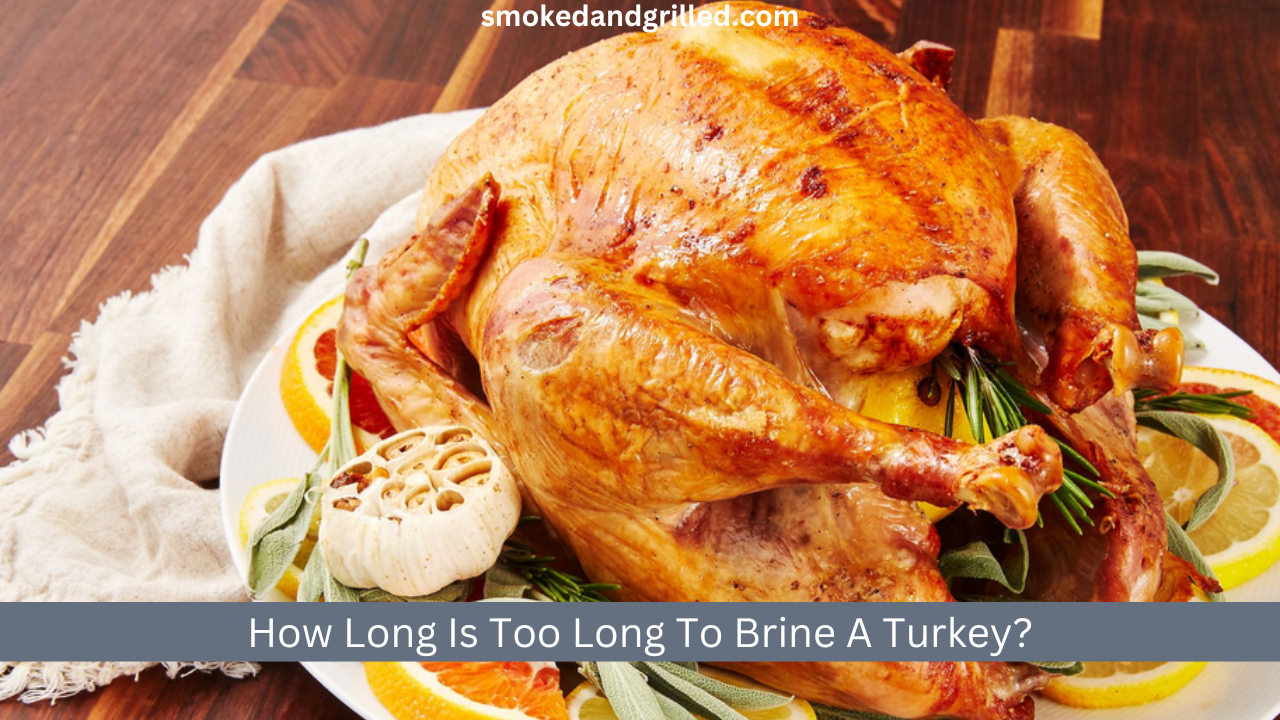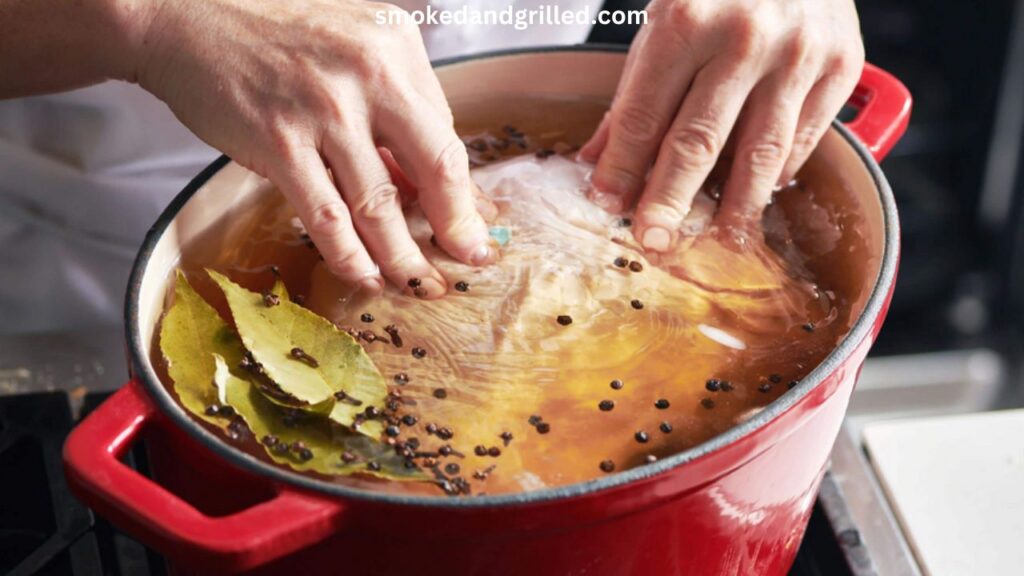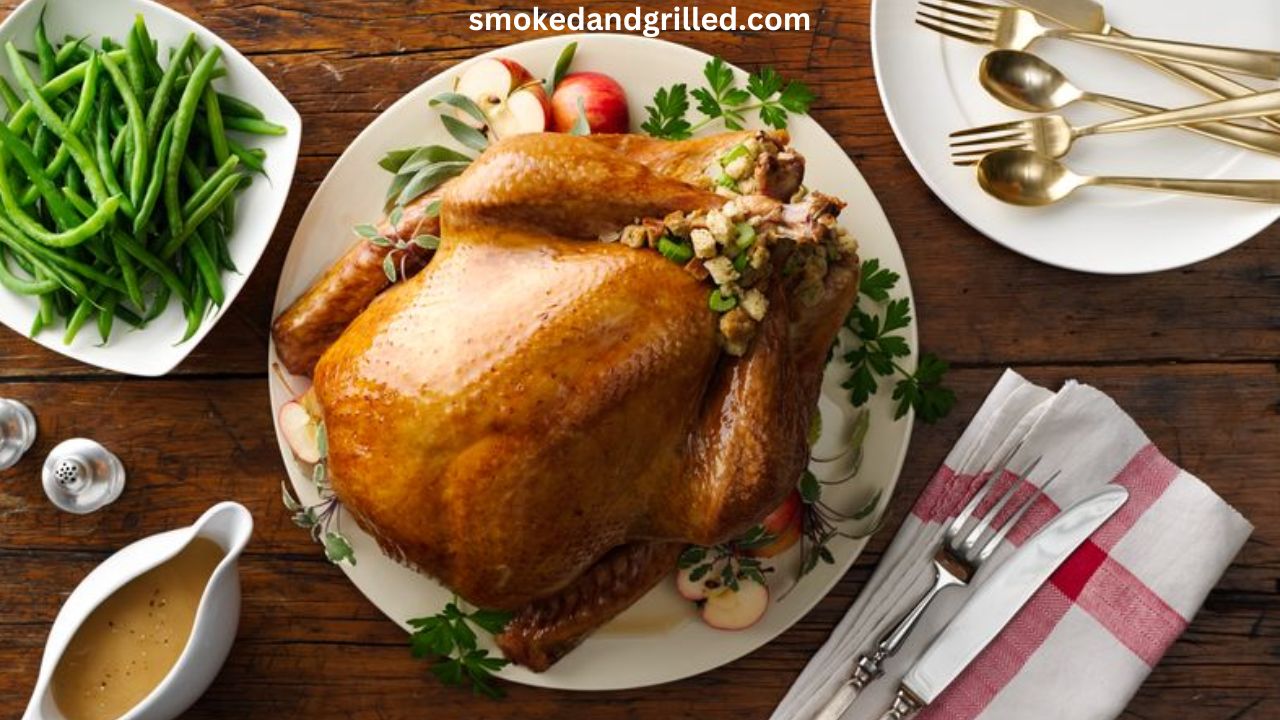Many of us look forward to holiday dinners so that we can enjoy the delicious flavors of a well roasted turkey.
Chefs and home cooks alike may be wondering, “How long is too long to brine a turkey?” when they begin the process of preparing the bird.
Submerging the bird in a saltwater solution, or “brining,” is a tried and true method for improving both flavor and moisture.
However, determining the appropriate brining time is essential, since going too far outside that range can have undesirable effects.
With the information in this article, you may rest assured that your turkey will be a gourmet triumph rather than a brining mishap, as we investigate the science behind the optimal brining period for a turkey.
Related Posts:
- How Long To Brine A Turkey Breast? (Optimal Time)
- How Long To Brine A Turkey Crown? [Complete Guide]
Can You Brine A Turkey For Too Long? What Are The Consequences?
Brining is a great way to give a turkey flavor and moisture, but there is a limit to how long you should brine the bird.
If you brine a turkey for too long, the meat may become excessively salty or mushy.
In addition, if the turkey is exposed to too much salt, it may take on an undesirable flavor.
Depending on the size of the bird, the recommended brining time can be anywhere from 12 to 24 hours.
If you want your turkey to have just the right combination of flavors and textures, it’s crucial that you brine it for the amount of time specified in recipes.
Are There Any Guidelines For Brining Times Based On The Size Of The Turkey?
The amount of time spent brining is generally proportional to the turkey’s size, but there are certain exceptions. Typically, the size or weight of the bird dictates how long it should be brined.
Smaller turkeys (about 10–12 pounds) can be brined for 12–16 hours. Turkeys between 12 and 16 pounds are considered medium-sized, and may need to be brined for 16 to 20 hours.
Brining turkeys for 20-24 hours may help tenderize those that weigh more than 16 pounds.
However, particular brining recipes or instructions should be consulted as some recipes may advise longer or shorter brining times based on their own taste profiles or methodologies.
Make sure you get the greatest results for your specific turkey size by consulting reliable sources, recipes, or advice from experts.
What Happens If You Brine A Turkey For 2 Days?
The texture, flavor, and overall quality of a turkey can suffer if it is brined for more than the suggested amount of time, which is about 2 days.
Turkey that has been brined for too long might become too salty and soggy.
Brined beef is more soft and juicy because the salt in the brine denatures the meat’s protein fibers.
While tenderness is desirable, meat that has been brined for too long risks losing its distinctive texture.
If you want your turkey to have the ideal blend of flavors and textures, you must brine it for the specified amount of time, which is usually between 12 and 24 hours.
Will A Longer Brining Time Affect The Flavor Profile Of The Turkey?
The turkey’s flavor will change if you brine it for a longer period of time. The meat’s flavor is enhanced by the brine solution’s infusion into the meat during the brining process.
The more time you spend brining, the more thoroughly the flavor is infused.
This results in a more robust and intense flavor. The aromatics, herbs, spices, and salt from the brine are absorbed by the turkey, making for a more robust and flavorful final product.
If the brine soaks in too thoroughly, the final product will be saltier than some people prefer.
The appropriate duration for brining depends on the individual’s tastes as well as the recipe or instructions being used
. It’s best to stick to the brining times specified in recipes or other reliable references.
These suggestions are meant to help you obtain the best possible flavor profile while yet preserving the turkey’s authentic flavor.
The final flavor profile can be adjusted by brining for varying amounts of time.
Changing the length of time the turkey spends in the brine can give you control over the intensity of the infusion, making for a more or less traditional flavor profile and ultimately a more or less memorable meal.
Can You Achieve Good Results By Brining A Turkey For A Shorter Time?
Although the taste boost from a shorter brining time may not be as noticeable, it is still possible to get outstanding results with a turkey.
The optimal brining time for a turkey is between 12 to 24 hours, but successful results can be achieved with shorter brining times as well.
Infusing flavor and moisture into the turkey is possible even with a short 4- to 6-hour brine soak.
While a shorter brining time may result in a less intense flavor infusion, it still has the potential to improve the turkey’s juicy and soft texture.
A shorter brining period can also be useful if you’re short on time or like a more subdued flavor.
You may still have a tasty and well-textured turkey with less time spent brining if you keep a tight eye on the bird and adjust the brining process accordingly.
How Does The Brining Time Affect The Saltiness Of The Turkey?
The level of saltiness in the turkey is proportional to how long it was brined. The turkey will take on a saltier flavor after being submerged in the brine solution for a longer period of time.
Turkey gets infused with taste and retains more moisture because to the salt in the brine solution.
However, if the turkey is brined for longer than necessary, the meat might become overly salty.
Shorter brining times, between 4 and 6 hours, infuse less salt into the meat and produce a more nuanced flavor.
When brining, it’s important to strike just the proper balance between salty and other flavors.
By carefully adhering to prescribed brining periods and quantities of salt to water in the brine solution, you can rest assured that your turkey will be perfectly seasoned without being overly salty.
Are There Any Health Concerns Associated With Brining A Turkey For Too Long?
Potential health risks associated with long-term turkey brining.
When a turkey is brined for too long, bacteria can grow from the bird’s prolonged exposure to the brine solution, especially if the turkey isn’t refrigerated.
The health concerns associated with brining a turkey can be reduced by adhering to standard food safety procedures.
The turkey needs to be refrigerated while brining, stored in a clean, disinfected container, then cooked to an internal temperature of 165 degrees Fahrenheit or 74 degrees Celsius before being eaten.
You may have a tasty and healthy turkey without risking your health if you follow proper food safety procedures and brine it for the correct amount of time.
Is There A Maximum Recommended Brining Time For Food Safety Reasons?
While there is no hard and fast rule about how long a meal can be brined before it becomes unsafe to eat, it is best to keep the brining process to a minimum.
If the turkey isn’t adequately chilled, the longer it sits in the brine solution, the more time bacteria have to proliferate and spoil the meat.
Brine for as long as you can, but always be sure to use safe food handling practices to avoid any contamination.
FAQs
Will A Longer Brining Time Affect The Flavor Profile Of The Turkey?
The turkey’s flavor can be altered by brining it for a longer period of time.
Because the brine solution has more time to permeate the meat, the flavor is more concentrated and robust.
Brining for longer than necessary might result in a salty or overbearing flavor, so it’s important to strike the appropriate balance.
A well-balanced and pleasurable turkey flavor profile can be achieved by taking into account personal preferences and following the suggested recommendations.
What Happens If You Exceed The Recommended Brining Time For A Turkey?
A turkey’s flavor and texture can suffer if it’s brined for longer than suggested.
Due to the meat’s prolonged contact with the brine solution, it absorbs far too much salt, giving the meat an unnatural and overpoweringly salty flavor.
The turkey’s natural hardness might also be lost in the cooking process, making the meat too tender.
To get the right combination of flavor and texture in your turkey, it’s crucial to brine it for the appropriate amount of time.
What Are The Potential Risks Of Brining A Turkey For An Extended Period?
There are a few things that could go wrong if you brine a turkey for a long time.
Meat that has been brined for too long runs the risk of becoming salty and mushy.
In addition, if the turkey is not chilled correctly after a lengthy brining, bacteria might proliferate and spoil the meat. There’s a higher chance of becoming sick from eating this.
To avoid these problems, it’s important to brine the turkey for the required amount of time, store it in the fridge while it’s brining, and cook it at the right temperature.
Should The Brining Time Be Adjusted Based On The Type Of Turkey (Fresh, Frozen, Organic, Etc.)?
Depending on the turkey you use, you may need to alter the brining time.
Because of their greater density, frozen turkeys often need more time in the brine than their fresh counterparts.
However, organic turkeys may just need a partial brining because they contain less water.
To determine the optimal brining period and guarantee the best results in terms of flavor and texture, it is recommended to consult specific recipes or guidelines for the type of turkey being used.
Conclusion
In conclusion, the answer to the question of how long is too long to brine a turkey is crucial if you want your bird to be the tasty and well-balanced star of the meal.
Although brining improves softness, juicyness, and flavor, too much time in the brine might have the opposite effect.
Turkey meat that has been brined for too long becomes salty and mushy, ruining the bird’s otherwise delicious flavor and texture.
It is essential to find a happy medium and stick to the suggested brining times, which normally range from 12 to 24 hours.
If you follow these steps, you’ll have perfectly seasoned turkey that doesn’t dominate the bird’s inherent taste.
When deciding how long to brine a turkey, it’s important to think about things like bird size, breed, and your own preferences.
If you pay close enough care, you can brine a turkey to perfection and serve a delectable meal that will have your guests asking for more.
Also Read:
How Long to Smoke a 20lb Turkey at 300 degrees? Useful Tips and Tricks!



